- Home
- Frank Herbert
The Santaroga Barrier Page 3
The Santaroga Barrier Read online
Page 3
It wasn’t normal, though, and Dasein’s senses screamed this fact at him. The brittle surface of this room was prepared to shatter once more and Dasein didn’t think he would like what might be revealed. He wiped his lips on his napkin, took his briefcase and headed for the lobby.
His suitcase stood atop the desk beside the register. There was a buzzing and murmurous sound of a switchboard being operated in the room through the doors at the rear corner. He took the suitcase, fingered the brass room key in his pocket—two fifty-one. If there was no phone in the room, he decided he’d come down and place his call to Chami from a booth.
Feeling somewhat foolish and letdown after his reaction to the scene in the dining room, Dasein headed for the stairs. A few eyes peered at him over the tops of newspapers from the lobby chairs. The eyes looked alert, inquisitive.
The stairs led to a shadowy mezzanine—desks, patches of white paper. A fire door directly ahead bore the sign: “To Second Floor. Keep this door closed.”
The next flight curved left, dim overhead light, wide panels of dark wood. It led through another fire door into a hall with an emergency exit sign off to the left. An illuminated board opposite the door indicated room two fifty-one down the hall to the right. Widely spaced overhead lights, the heavy pile of a maroon carpet underfoot, wide heavy doors with brass handles and holes for old-fashioned passkeys gave the place an aura of the Nineteenth Century. Dasein half expected to see a maid in ruffled cap, apron with a bow at the back, long skirt and black stockings, sensible shoes—or a portly banker type with tight vest and high collar, an expanse of gold chain at the waist. He felt out of place, out of style here.
The brass key worked smoothly in the door of two fifty-one; it let him into a room of high ceilings, one window looking down onto the parking area. Dasein turned on the light. The switch controlled a tasseled floor lamp beside a curve-fronted teak dresser. The amber light revealed a partly opened doorway into a tiled bathroom (the sound of water dripping there), a thick-legged desk-table with a single straight chair pushed against it. The bed was narrow and high with a heavily carved headboard.
Dasein pushed down on the surface of the bed. It felt soft. He dropped his suitcase onto the bed, stared at it. An edge of white fabric protruded from one end. He opened the suitcase, studied the contents. Dasein knew himself for a prissy, meticulous packer. The case now betrayed a subtle disarray. Someone had opened it and searched it. Well, it hadn’t been locked. He checked the contents—nothing missing.
Why are they curious about me? he wondered.
He looked around for a telephone, found it, a standard French handset, on a shelf beside the desk. As he moved, he caught sight of himself in the mirror above the dresser—eyes wide, mouth in a straight line. Grim. He shook his head, smiled. The smile felt out of place.
Dasein sat down in the straight chair, put the phone to his ear. There was a smell of disinfectant soap in the room—and something like garlic. After a moment, he jiggled the hook.
Presently, a woman’s voice came on: “This is the desk.”
“I’d like to place a call to Berkeley,” Dasein said. He gave the number. There was a moment’s silence, then: “Your room number, sir?”
“Two fifty-one.”
“One moment, please.”
He heard the sound of dialing, ringing. Another operator came on the line. Dasein listened with only half his attention as the call was placed. The smell of garlic was quite strong. He stared at the high old bed, his open suitcase. The bed appeared inviting, telling him how tired he was. His chest ached. He took a deep breath.
“Dr. Selador here.”
Selador’s India-cum-Oxford accent sounded familiar and close. Dasein bent to the telephone, identified himself, his mind caught suddenly by that feeling of intimate nearness linked to the knowledge of the actual distance, the humming wires reaching down almost half the length of the state.
“Gilbert, old fellow, you made it all right, I see.” Selador’s voice was full of cheer.
“I’m at the Santaroga House, Doctor.”
“I hear it’s quite comfortable.”
“Looks that way.” Through his buzzing tiredness, Dasein felt a sense of foolishness. Why had he made this call? Selador’s sharp mind would probe for underlying meanings, motives.
“I presume you didn’t call just to tell me you’ve arrived,” Selador said.
“No … I …” Dasein realized he couldn’t express his own vague uneasiness, that it wouldn’t make sense, this feeling of estrangement, the separation of Santarogans and Outsiders, the pricklings of warning fear. “I’d like you to look into the oil company dealings with this area,” Dasein said. “See if you can find out how they do business in the valley. There’s apparently an independent service station here. I want to know who supplies the gas, oil, parts—that sort of thing.”
“Good point, Gilbert. I’ll put one of our …” There was a sudden crackling, bapping sound on the line. It stopped and there was dead silence.
“Dr. Selador?”
Silence.
Damn! Dasein thought. He jiggled the hook. “Operator. Operator!”
A masculine voice came on the line. Dasein recognized the desk clerk’s twang. “Who’s that creating all that commotion?” the clerk demanded.
“I was cut off on my call to Berkeley,” Dasein said. “Could you …”
“Line’s out,” the clerk snapped.
“Could I come down to the lobby and place the call from a pay phone?” Dasein asked. As he asked it, the thought of walking that long distance down to the lobby repelled Dasein. The feeling of tiredness was a weight on his chest.
“There’s no line out of the valley right now,” the clerk said. “Call can’t be placed.”
Dasein passed a hand across his forehead. His skin felt clammy and he wondered if he’d picked up a germ. The room around him seemed to expand and contract. His mouth was dry and he had to swallow twice before asking: “When do they expect to have the line restored?”
“How the hell do I know?” the clerk demanded.
Dasein took the receiver away from his ear, stared at it. This was a very peculiar desk clerk … and a very peculiar room the way it wavered and slithered with its stench of garlic and its …
He grew aware of a faint hissing.
Dasein’s gaze was drawn on a string of growing astonishment to an old-fashioned gaslight jet that jutted from the wall beside the hall door.
Stink of garlic? Gas!
A yapping, barking voice yammered on the telephone.
Dasein looked down at the instrument in his hand. How far away it seemed. Through the window beyond the phone he could see the Inn sign: Gold Rush Museum. Window equaled air. Dasein found muscles that obeyed, lurched across the desk, fell, smashing the telephone through the window.
The yapping voice grew fainter.
Dasein felt his body stretched across the desk. His head lay near the shattered window. He could see the telephone cord stretching out the window. There was cool air blowing on a distant forehead, a painful chill in his lungs.
They tried to kill me, he thought. It was a wondering thought, full of amazement. His mind focused on the two investigators who’d already died on this project—accidents. Simple, easily explained accidents … just like this one!
The air—how cold it felt on his exposed skin. His lungs burned with it. There was a hammering pulse at his temple where it pressed against the desk surface. The pulse went on and on and on …
A pounding on wood joined the pulse. For a space, they beat in an insane syncopation.
“You in there! Open up!” How commanding, that voice. Open up, Dasein thought. That meant getting to one’s feet, crossing the room, turning a door handle …
I’m helpless, he thought. They could still kill me.
He heard metal rasp against metal. The air blew stronger across his face. Someone said: “Gas!”
Hands grabbed Dasein’s shoulders. He was hauled back, half ca
rried, half dragged out of the room. The face of Marden, the red-haired patrol captain, swung across his vision. He saw the clerk: pale, staring face, bald forehead glistening under yellow light. There was a brown ceiling directly in front of Dasein. He felt a rug, hard and rasping, beneath his back.
A twanging voice said: “Who’s going to pay for that window?” Someone else said: “I’ll get Dr. Piaget.”
Dasein’s attention centered on Marden’s mouth, a blurred object seen through layers of distortion. There appeared to be anger lines at the corners of the mouth. It turned toward the hovering pale face of the desk clerk, said: “To hell with your window, Johnson! I’ve told you enough times to get those gas jets out of this place. How many rooms still have them?”
“Don’t you take that tone with me, Al Marden. I’ve known you since …”
“I’m not interested in how long you’ve known me, Johnson. How many rooms still have those gas jets?”
The clerk’s voice came with an angry tone of hurt: “Only this’n an’ four upstairs. Nobody in the other rooms.”
“Get ’em out by tomorrow night,” Marden said.
Hurrying footsteps interrupted the argument. Dr. Piaget’s round face blotted out Dasein’s view of the ceiling. The face wore a look of concern. Fingers reached down, spread Dasein’s eyelids. Piaget said: “Let’s get him on a bed.”
“Is he going to be all right?” the clerk asked.
“It’s about time you asked,” Marden said.
“We got him in time,” Piaget said. “Is that room across the hall empty?”
“He can have 260,” the clerk said. “I’ll open it.”
“You realize this is Jenny’s fellow from the school you almost killed?” Marden asked, his voice receding as he moved away beside the clerk.
“Jenny’s fellow?” There was the sound of a key in a lock. “But I thought …”
“Never mind what you thought!”
Piaget’s face moved close to Dasein. “Can you hear me, young fellow?” he asked.
Dasein drew in a painful breath, croaked, “Yes.”
“You’ll have quite a head, but you’ll recover.”
Piaget’s face went away. Hands picked Dasein up. The ceiling moved. There was another room around him: like the first one—tall ceiling, even the sound of dripping water. He felt a bed beneath his back, hands beginning to undress him. Sudden nausea gripped him. Dasein pushed the hands away.
Someone helped him to the bathroom where. he was sick. He felt better afterward—weak, but with a clearer head, a better sense of control over his muscles. He saw it was Piaget who’d helped him.
“Feel like getting back to bed now?” Piaget asked.
“Yes.”
“I’ll give you a good shot of iron to counteract the gas effect on your blood,” Piaget said. “You’ll be all right.”
“How’d that gas jet get turned on?” Dasein asked. His voice came out a hoarse whisper.
“Johnson got mixed up fooling with the valves in the kitchen,” Piaget said. “Wouldn’t have been any harm done if some idiot hadn’t opened the jet in your room.”
“I coulda sworn I had ’em all turned off.” That was the clerk’s voice from somewhere beyond the bathroom door.
“They better be capped by tomorrow night,” Marden said.
They sounded so reasonable, Dasein thought. Marden appeared genuinely angry. The look on Piaget’s face could be nothing other than concern.
Could it have been a real accident? Dasein wondered.
He reminded himself then two men had died by accident in this valley while engaged in the investigation.
“All right,” Piaget said. “Al, you and Pim and the others can clear out now. I’ll get him to bed.”
“Okay, Larry. Clear out, all of you.” That was Marden.
“I’ll get his bags from the other room.” That was a voice Dasein didn’t recognize.
Presently, with Piaget’s help, Dasein found himself in pajamas and in the bed. He felt clearheaded, wide awake and lonely even with Piaget still in the room.
Among strangers, Dasein thought.
“Here, take this,” Piaget said. He pressed two pills into Dasein’s mouth, forced a glass of water on him. Dasein gulped, felt the pills rasp down his throat in a wash of water.
“What was that?” Dasein asked as he pushed the glass away.
“The iron and a sedative.”
“I don’t want to sleep. The gas …”
“You didn’t get enough gas to make that much difference. Now, you rest easy.” Piaget patted his shoulder. “Bed rest and fresh air are the best therapy you can get. Someone’ll look in on you from time to time tonight. I’ll check back on you in the morning.”
“Someone,” Dasein said. “A nurse?”
“Yes,” Piaget said, his voice brusk. “A nurse. You’ll be as safe here as in a hospital.”
Dasein looked at the night beyond the room’s window. Why the feeling of danger now, then? he wondered. Is it reaction? He could feel the sedative blurring his senses, soothing him. The sense of danger persisted.
“Jenny will be happy to know you’re here,” Piaget said. He left the room, turning off the light, closing the door softly.
Dasein felt he had been smothered in darkness. He fought down panic, restored himself to a semblance of calm.
Jenny … Jenny …
Marden’s odd conversation with the clerk, Johnson, returned to him. “ … Jenny’s fellow from the school …”
What had Johnson thought? What was the thing Marden had cut short?
Dasein fought the sedative. The drip-drip of water in the bathroom invaded his awareness. The room was an alien cell.
Was it just an accident?
He remembered the fragmented confusion of the instant when he’d focused on that hissing gas jet. Now, when the danger was past, he felt terror.
It couldn’t have been an accident!
But why would Johnson want to kill him?
The disconnected telephone call haunted Dasein. Was the line really down? What would Selador do? Selador knew the dangers here.
Dasein felt the sedative pulling him down into sleep. He tried to focus on the investigation. It was such a fascinating project. He could hear Selador explaining the facets that made the Santaroga Project such a glittering gem—
“Taken singly, no item in this collection of facts could be considered alarming or worthy of extended attention. You might find it interesting that no person from Cloverdale, California, could be found in a mental hospital. It might be of passing interest to learn that the people of Hope, Missouri, consumed very little tobacco. Would you be alarmed to discover that all the business of Enumclaw, Washington, were locally owned? Certainly not. But when you bring all of these and the other facts together into a single community, something disturbing emerges. There is a difference at work here.”
The drip of water in the bathroom was a compelling distraction. Dangerous difference, Dasein thought. Who’ll look in on me? he wondered.
It occurred to him to ask himself then who had sounded the alarm. The breaking window had alerted someone. The most likely person would be Johnson, the room clerk. Why would he bring help to the person he was trying to kill? The paranoia in his own thoughts began to impress itself on Dasein.
It was an accident, Dasein thought. It was an accident in a place of dangerous difference.
Dasein’s morning began with a sensation of hunger. He awoke to cramping pains. Events of the night flooded into his memory. His head felt as though it had been kicked from the inside.
Gently, he pushed himself upright. There was a window directly ahead of him with the green branch of an oak tree across it. As though his muscles were controlled by some hidden force, Dasein found himself looking up at the door to see if there was a gas jet. Nothing met his questing gaze but a patch on the wallpaper to mark the place where a jet had been.
Holding his head as level as possible, Dasein eased himself out of bed and
into the bathroom. A cold shower restored some of his sense of reality.
He kept telling himself: It was an accident.
A bluejay was sitting on the oak branch screeching when Dasein emerged from the bathroom. The sound sent little clappers of pain through Dasein’s head. He dressed hurriedly, hunger urging him. The bluejay was joined by a companion. They screeched and darted at each other through the oak tree, their topknots twitching. Dasein gritted his teeth, faced the mirror to tie his tie. As he was finishing the knot, he saw reflected in the mirror the slow inward movement of the hall door. A corner of a wheeled tray appeared. Dishes clattered. The door swung wider.
Jenny appeared in the doorway pushing the tray. Dasein stared at her in the mirror, his hands frozen at the tie. She wore a red dress, her long black hair caught in a matching bandeaux. Her skin displayed a healthy tan. Blue eyes stared back at him in the mirror. Her oval face was set in a look of watchful waiting. Her mouth was as full as he remembered it, hesitating on the edge of a smile, a dimple flickering at her left cheek.
“Finish your tie,” she said. “I’ve brought you some breakfast.” Her voice had a well-remembered, throaty, soothing tone.
Dasein turned, moved toward her as though pulled by strings. Jenny abandoned the cart, met him halfway. She came into his arms, lifting her lips to be kissed. Dasein, feeling the warmth of her kiss and the familiar pressure of her against him, experienced a sensation of coming home.
Jenny pulled away, studied his face. “Oh, Gil,” she said, “I’ve missed you so much. Why didn’t you even write?”
He stared at her, surprised to silence for a moment, then: “But I did write. You never answered.”
She pushed away from him, her features contorted by a scowl. “Ohhh!” She stamped her foot.
“Well, I see you found him.” It was Dr. Piaget in the doorway. He pushed the cart all the way into the room, closed the door.
Jenny whirled on him. “Uncle Larry! Did you keep Gil’s letters from me?”

 Direct Descent
Direct Descent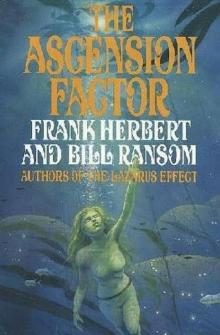 The Ascension Factor
The Ascension Factor The Heaven Makers
The Heaven Makers Children of Dune
Children of Dune Old Rambling House
Old Rambling House Dune
Dune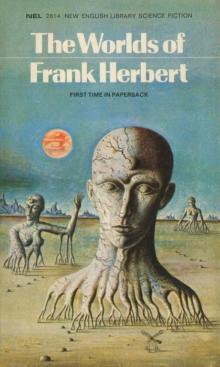 The Worlds of Frank Herbert
The Worlds of Frank Herbert The Jesus Incident
The Jesus Incident Heretics of Dune
Heretics of Dune Whipping Star
Whipping Star Dune Messiah
Dune Messiah Man of Two Worlds
Man of Two Worlds The Book of Frank Herbert
The Book of Frank Herbert Hunters Of Dune
Hunters Of Dune The Tactful Saboteur
The Tactful Saboteur Soul Catcher
Soul Catcher God Emperor of Dune
God Emperor of Dune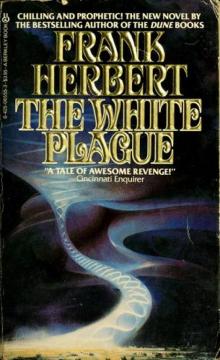 The White Plague
The White Plague The Green Brain
The Green Brain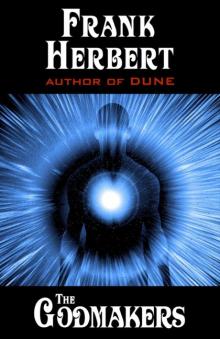 The Godmakers
The Godmakers Sandworms of Dune
Sandworms of Dune Destination Void
Destination Void The Dosadi Experiment
The Dosadi Experiment Eye
Eye High-Opp
High-Opp The Eyes of Heisenberg
The Eyes of Heisenberg Missing Link
Missing Link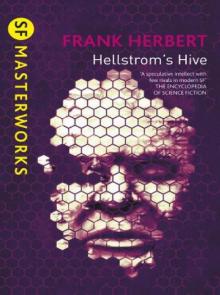 Hellstrom's Hive
Hellstrom's Hive Chapterhouse: Dune
Chapterhouse: Dune The Santaroga Barrier
The Santaroga Barrier The Dragon in the Sea
The Dragon in the Sea Operation Haystack
Operation Haystack A Thorn in the Bush
A Thorn in the Bush Four Unpublished Novels
Four Unpublished Novels Dune dc-1
Dune dc-1 Jorj X. McKie 1 - Whipping Star
Jorj X. McKie 1 - Whipping Star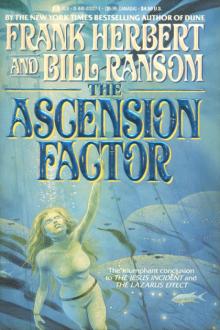 DV 4 - The Ascension Factor
DV 4 - The Ascension Factor Frank Herbert - Dune Book 4 - God Emperor Of Dune
Frank Herbert - Dune Book 4 - God Emperor Of Dune ChapterHouse: Dune dc-6
ChapterHouse: Dune dc-6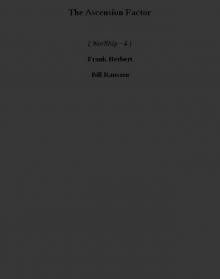 The Ascension Factor w-4
The Ascension Factor w-4 A Game of Authors
A Game of Authors Children of Dune dc-3
Children of Dune dc-3 Destination: Void: Prequel to the Pandora Sequence
Destination: Void: Prequel to the Pandora Sequence The Collected Stories of Frank Herbert
The Collected Stories of Frank Herbert Dune Messiah dc-2
Dune Messiah dc-2 Frank Herbert - Dune Book 5 - Heretics of Dune
Frank Herbert - Dune Book 5 - Heretics of Dune DV 3 - The Lazarus Effect
DV 3 - The Lazarus Effect The Jesus Incident w-2
The Jesus Incident w-2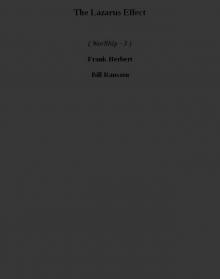 The Lazarus Effect w-3
The Lazarus Effect w-3 Frank Herbert
Frank Herbert The Ascension Factor: Pandora Sequence
The Ascension Factor: Pandora Sequence Dune (40th Anniversary Edition)
Dune (40th Anniversary Edition)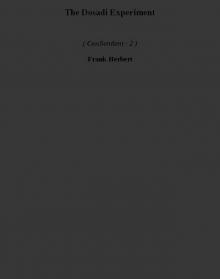 The Dosadi Experiment c-2
The Dosadi Experiment c-2 The Lazarus Effect
The Lazarus Effect God Emperor of Dune dc-4
God Emperor of Dune dc-4 The Pandora Sequence: The Jesus Incident, the Lazarus Effect, the Ascension Factor
The Pandora Sequence: The Jesus Incident, the Lazarus Effect, the Ascension Factor The Green Brain (v4.0)
The Green Brain (v4.0) The Heaven Makers (v4.0)
The Heaven Makers (v4.0) Heretics of Dune dc-5
Heretics of Dune dc-5